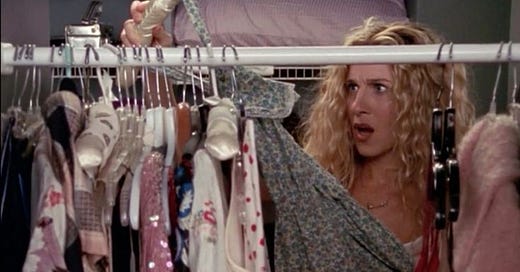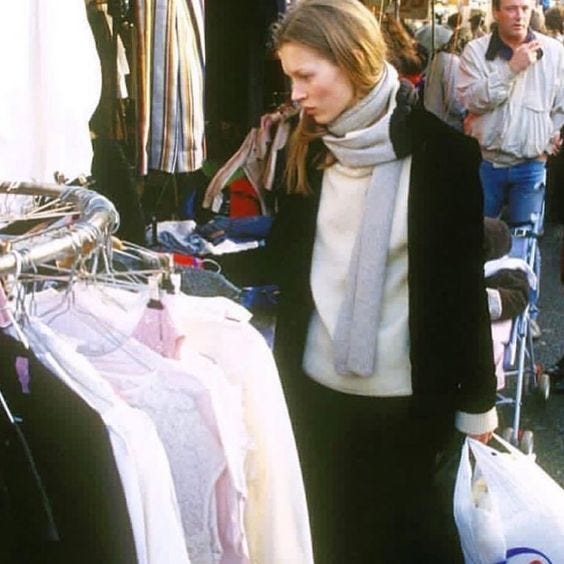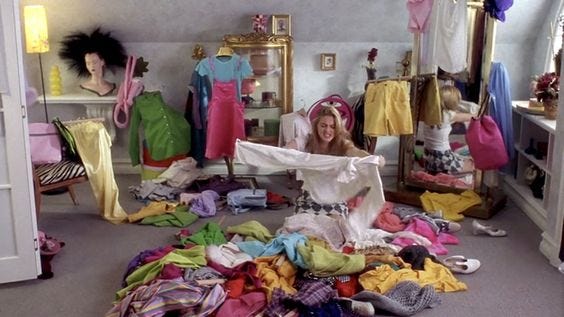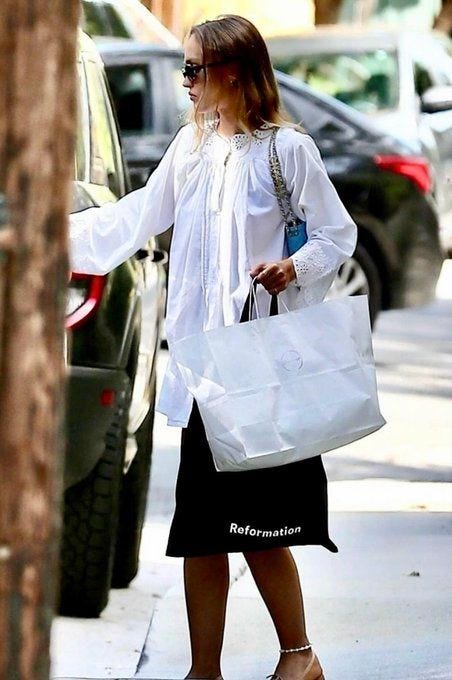i still remember the first time i discovered zara, i was in 9th grade and my family and i were visiting my older sister in dublin where she was studying. it was my first time in europe and as soon as i walked through the white shiny doors off of grafton street and came face-to-face with polyester replicas of runway pieces i screenshotted from style.com, my eyes grew wide with potential. i turned over price tags and was shocked at what i saw, comparable items were at least $50-$100 less than suburban mall stores i used to pine over. i had to sit on my suitcase the night before we left to zip it shut as new sleeves and plastic tags exploded from the sides. this was of course before i considered the impact of fast fashion from an environmental/ethical standpoint, at the time all i was told by press and celebrities that this was a great way to make fashion accessible to the masses. fashion for all!!!!!!!!!!
in college i started having that icky feeling in the pit of my stomach every time i bought a $30 corset top to wear to a sticky bar, the more classes i took on fashion, it’s impact and the repercussions of a accelerating trend cycle, the more i hated the way the cheap fabric felt against my skin. i’ve quelled my desire for constant sartorial newness in my life after being confronted with way too many disintegrated spray tanned stained garments from my youth; the disgust that washes over me when i discover a sad, limp item i bought in a failed attempt to make me appear a different, hotter person is enough to make me never impulse shop ever again. but i would be completely lying if i said my desire to buy clothes as a conduit for control over my life is gone. each step of the checkout process is a ritualistic high inching closer and closer to a warm new cocoon i can hide myself in, i relish typing in my billing information, savoring each letter one by one.
yesterday morning angelina, sydney b, valerie and i were waiting in line to get some pastries in brooklyn heights. we saw a few girls ahead of us all wearing the same iteration of a north/south slouchy leather tote from various brands, i noticed one of them was a $12 version i used to get tik tok ads for ($12!!!!!!!!!!!!!!!!!!!!!!!!!!!!!!!!!!!!!!!!!). i turned to my girls and said, “has anyone else noticed…. fast fashion is kind of back?” a few weeks ago charli xcx, arca, lila moss were announced as new h&m ambassadors for this winter, i was shocked that i didn’t see that much backlash… last week zara dropped a mini fashion film for their new zara streaming platform (editorial videos made shoppable) featuring KAIA GERBER and CINDY CRAWFORD, they were even styled by industry legend carlyle nerf de dudzeele. anecdotally i’ve slowly heard more and more friends say that they bought something from one of the plethora of Bad Stores, their expressions used to be deeply embarrassed and are now slowly creeping back to normal. my girls and i discussed this shift for a while and then we changed topics because i saw a really cute baby and then a really cute dog, 15 minutes later valerie touched the coat i was wearing (which i’ve had for 5+ years) and asked, “this is so cute where is it from?” i laughed and said, “h&m”.
i’ve been thinking a lot about the hierarchy of ethical consumption, what stores are and are not considered fast fashion… is j.crew “okay” to shop from? is COS just a slightly more expensive zara? a lot of “cool” people shop at uniqlo so it must be fine, right? i fear the exhausting merry-go-round of metrics deciding what is or isn’t okay to wear is causing people to just say “fuck it” and buy whatever they want morallessly. the price of clothing dramatically increasing makes the tenure of saving up to buy a luxury piece feel even more and more unattainable, i personally can’t fathom how to achieve a level of financial success that would allow me to buy a $1,650 turtleneck from The Row. i find a lot of the conversations surrounding fast fashion really frustrating, mainly because i find them unrealistic as it pertains to an average consumer. a lot of fashion girls (including myself) preach that everyone should save up for the pieces they really want instead of buying knock-offs, and while i completely agree with the sentiment for my own personal closet, i doubt whether this argument is compelling enough. most people i know who don’t work in fashion or quite simply care do not realize that those studded flats in zara are knock-offs of the alaia ones and they never will because they don’t care and would never spend $1.2k on the original. while i walk past the gleaming doors of stores in soho and roll my eyes because i know exactly what each garment that ominously hangs is referencing, a lot of shoppers just see a cute satin mini skirt with a little bow on the front that reminds them of something their favorite influencer just wore… for a mere $49 you can make that gap of who you are and who you want to be just slightly narrower. while i personally love vintage shopping and taking an entire afternoon to shift through racks and racks finding that perfect piece i’ll pass down to my kids one day and prefer scrolling on eBay and depop as opposed to scrolling on instagram or tik tok, a lot of people simply don’t have the time or do not enjoy shopping in that way.
a cynical part of me believes people care more about how they are perceived as opposed to actually caring about their ethical impact…. the second we stop thinking shopping at fast fashion is “uncool” is when we’re in biggggggggggggggg trouble. i wanted to write this to hopefully start a conversation about the way we shop because i am genuinely terrified when i think about the mess we are contributing to, but i also wanted to approach it with a very realistic perspective. i wish i was someone who never in their life bought anything from zara and instead has a capsule wardrobe of exclusively archival vintage pieces sourced from tokyo, but that is not me, nor is that most people. i unfortunately do understand the desperation of wanting to buy a $25 going-out top that is just just slutty enough but not too slutty (said endearingly) that will make you think “ohmygod he has to notice my new top” (which he definitely won’t). not everyone wants to intellectualize their taste, some people just want to look cute at an accessible price-point. what i want is for everyone to think a little more critically about our shopping habits, why we’re buying something, the intended lifespan of an item and for whom we are really buying it for. i want people to care for their zara and h&m garments like they are The Row in order to stretch out it’s lifespan for as much as physically possible because unfortunately i don’t see fast fashion going away any time soon. i want to encourage people to understand what they *actually* like and not fall to the temptations of buying something trendy that will ultimately lay dormant in your closet after a few months. i want shopping second-hand to be as accessible as buying something from amazon and make the experience even smoother than if someone wanted to go into a store. i wish everyone watched the true cost, think about who and where their clothing is being made and consider the mountains and mountains of trash that is compounding with each shein haul that catapults on tik tok; unfortunately, it is a lot easier to fill your mind with the person who are about to become when you slip on that new polyester sweater that looks exactly like the toteme one you’ve been eyeing than it is to consider the cost it took to get you there.
it goes without saying, fast fashion stresses me out!!!!!!!!!!!!!!!!!!. i urge you to consider the material contents of what you buy (in every product description page + on the interior tag of a garment), try to minimize your consumption of virgin raw materials as much as possible, challenge companies to be transparent about their carbon footprint metrics and shop second hand/vintage when you can (the transformation of the re-sell market is a whole other challenging topic for a different essay… maybe one day!).
i do acknowledge that i skimmed the surface of this topic, there is SOOOOOO much more to it. i highly recommend reading fashionopolis by dana thomas.
i think i wanted to write this because i’ve been feeling uncharacteristically d*pressed lately which naturally means for me i’ve been tempted to spend exuberant amounts of money to soothe me like i am an infant with a blanket (only instead of a blanket it’s a simone rocha t-shirt). i’m trying to resist the temptation, writing this helped and i hope it helps you in some way.
please let me know what you thought of this… nicely please!!!!
xoxoxoxo











Ive been thinking a lot about this too and noticing it. And while I avoid the known worst offenders (SHEIN, Zara, HM, Boohoo etc) the opacity of garment supply chains makes it impossible for most consumers (including me!) to rule out contributing to fast fashion style clothing. Even if something costs more there’s really no way of knowing if workers were paid fairly to produce it most of the time.
My strategies are: whenever I can, I buy vintage. Buying new, I invest in the pieces that I obsess over for months and that are mostly made of natural fibers; and I wear my clothes until they have holes or terminal stains. I repair my clothes and shoes until they just can’t be fixed anymore. And if I can buy American-made, I do that too. Mostly I do not impulse buy.
None of this is enough. I still have way too many synthetic clothes and I still buy active wear from Amazon sometimes. But for most of us, being totally morally pure and good in what we buy is just not possible. So my strategy is: use everything I have for as long as possible and buy with that in mind.
I feel like fast fashion never left but maybe it had a brief moment of uncoolness and now no one cares at all so everything is up for grabs.
What’s really got me depressed this year is the realisation that brands I trusted to be “sustainable” or “nice” or at least “slower fashion than shein” have completely dropped that facade. Madewell, Anthropologie, and Reformation have all been decreasing the quality of their clothes for years, so even at their higher price point it doesn’t mean you’re getting a fairly made item. Shopping sustainably/ethically is already rough, but once you add in being plus sized it feels damn near impossible to stick to your morals (much less your clothing preferences)